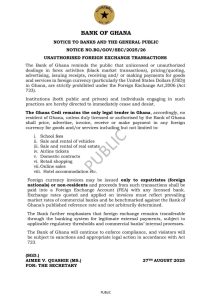
The Bank of Ghana (BoG) has issued a public reminder that unlicensed or unauthorized foreign exchange transactions are strictly prohibited under the Foreign Exchange Act, 2006 (Act 723). This includes black market dealings, pricing, quoting, advertising, issuing receipts, and making or receiving payments in foreign currencies, especially the US dollar.
In a statement signed by Ms. Aimee V. Quashie on behalf of the Secretary of the Bank of Ghana, dated Wednesday, August 27, 2025, the Central Bank directed all public and private institutions, as well as individuals, engaged in such practices to cease immediately.
Related To This
BoG Reveals Gold Exports Out-Earn Total Imports in June 2025
“We Told You So” – IERPP Teases Gov’t Following IMF’s Caution on Cedi Management
The Bank emphasized that the Ghana Cedi remains the only legal tender in Ghana. Therefore, no resident of Ghana, unless licensed or authorized by the Bank of Ghana, is permitted to price, advertise, invoice, or receive payment in foreign currency for goods and services.
The prohibited transactions include, but are not limited to: School fees, Sale and rental of vehicles, Sale and rental of real estate, Airline tickets, Domestic contracts, Retail shopping, Online sales, and Hotel accommodation.

The statement clarified that foreign currency invoices may only be issued to expatriates (foreign nationals) or non-residents, with proceeds required to be paid into a Foreign Exchange Account (FEA) with a licensed bank.
Furthermore, exchange rates quoted on such invoices must reflect prevailing market rates of commercial banks and be benchmarked against the BoG’s published reference rate, rather than being arbitrarily determined.
The Bank assured the public that foreign exchange remains transferable through the formal banking system for legitimate external payments, subject to regulatory thresholds and commercial banks’ internal processes.
The BoG reiterated its commitment to enforcing compliance, warning that violators will face sanctions and legal action under Act 723.




